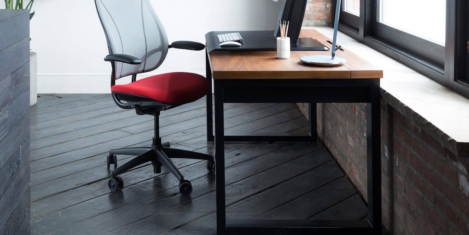January 17, 2018
One in ten people have fantasised about killing their boss
 A new survey of 2,200 people claims that one in ten have fantasised about killing their boss at some point. Construction workers emerged as having the worst relationship with their line managers with nearly a quarter admitting to murderous thoughts (22 percent), followed closely by those working in the media industry (15 percent). The report from B2B comparison site Expert Market claims that more than half of respondents (52 percent) said that they hate their job specifically because of their boss. In fact, one in five workers said that they would actually turn down a pay rise in favour of firing their manager and it’s because people think their boss is not fit for purpose. The majority of those asked (73 percent) believe that they could do their boss’ job far better than them, particularly those in the energy and entertainment industries; 86 percent and 81 percent, respectively.
A new survey of 2,200 people claims that one in ten have fantasised about killing their boss at some point. Construction workers emerged as having the worst relationship with their line managers with nearly a quarter admitting to murderous thoughts (22 percent), followed closely by those working in the media industry (15 percent). The report from B2B comparison site Expert Market claims that more than half of respondents (52 percent) said that they hate their job specifically because of their boss. In fact, one in five workers said that they would actually turn down a pay rise in favour of firing their manager and it’s because people think their boss is not fit for purpose. The majority of those asked (73 percent) believe that they could do their boss’ job far better than them, particularly those in the energy and entertainment industries; 86 percent and 81 percent, respectively.











 Two-thirds (64 percent) of employees have gone to work despite being unwell over the last 12 months, claims a new survey which found that a quarter (26 percent) of people worried that their absence will be a burden on their team. The research by Bupa shows that more than one in four (27 percent) employees ignore their doctor’s orders to stay at home and ‘soldier on’. A third of employees would go to work despite back pain or issues related to their joints and, disturbingly, a similar number (29 percent) head to work when suffering from mental health issues such as depression. As two of the most common reasons to be signed off work, Bupa’s experts fear these employees risk worsening their health, increasing the likelihood that they’ll need a prolonged period of time off work further down the line. The findings come at a time when increasing productivity is a strategic goal for most business leaders in 2018. But high levels of ‘presenteeism’ are in fact associated with loss of productivity and reduced performance – as employees who push themselves into work when unwell, risk delaying their own recovery
Two-thirds (64 percent) of employees have gone to work despite being unwell over the last 12 months, claims a new survey which found that a quarter (26 percent) of people worried that their absence will be a burden on their team. The research by Bupa shows that more than one in four (27 percent) employees ignore their doctor’s orders to stay at home and ‘soldier on’. A third of employees would go to work despite back pain or issues related to their joints and, disturbingly, a similar number (29 percent) head to work when suffering from mental health issues such as depression. As two of the most common reasons to be signed off work, Bupa’s experts fear these employees risk worsening their health, increasing the likelihood that they’ll need a prolonged period of time off work further down the line. The findings come at a time when increasing productivity is a strategic goal for most business leaders in 2018. But high levels of ‘presenteeism’ are in fact associated with loss of productivity and reduced performance – as employees who push themselves into work when unwell, risk delaying their own recovery






 Half of SMEs (50 percent) questioned in a new survey have changed the way that they recruit their staff as a result of Brexit. The Albion Growth Report 2017 of more than 1,000 SMEs suggests that for businesses which have changed their strategy as a result of Brexit, 15 percent have decreased recruitment resources, 10 percent have begun recruiting in different ways and 9 percent have made redundancies. A difficulty in finding skilled staff is one of the biggest barriers to growth, behind broader political uncertainty and cash flow, which the research claims could lead to a potential war for talent which is likely to become more intense in the post-Brexit environment. By contrast, SMEs view difficulty in finding unskilled staff as the least significant barrier to growth. The report finds that nearly two thirds (65 percent) of SMEs believe their business lacks expertise. More than a quarter (26 percent) of businesses lack marketing talent, followed by business planning (19 percent), IT (17 percent), and software developers and technology specialists (17 percent). Despite critical skills deficits, only a third of SMEs (33 percent) are currently hiring new employees.
Half of SMEs (50 percent) questioned in a new survey have changed the way that they recruit their staff as a result of Brexit. The Albion Growth Report 2017 of more than 1,000 SMEs suggests that for businesses which have changed their strategy as a result of Brexit, 15 percent have decreased recruitment resources, 10 percent have begun recruiting in different ways and 9 percent have made redundancies. A difficulty in finding skilled staff is one of the biggest barriers to growth, behind broader political uncertainty and cash flow, which the research claims could lead to a potential war for talent which is likely to become more intense in the post-Brexit environment. By contrast, SMEs view difficulty in finding unskilled staff as the least significant barrier to growth. The report finds that nearly two thirds (65 percent) of SMEs believe their business lacks expertise. More than a quarter (26 percent) of businesses lack marketing talent, followed by business planning (19 percent), IT (17 percent), and software developers and technology specialists (17 percent). Despite critical skills deficits, only a third of SMEs (33 percent) are currently hiring new employees.
 There has been a rise in the number of people who believe businesses in the UK have a good reputation, with a significant number of younger people helping to create this positive picture. The research, comparing perceptions of businesses between May and November 2017, reveals 2 in 3 people think UK businesses have a good reputation, up 7 percent in 6 months. The tracker, conducted by the CBI in partnership with global PR agency, Porter Novelli, and research company, Opinium, revealed that the public are more aware of the value business provides in local communities with an increasingly vocal business community emerging in recent months. Importantly, the improvement in business reputation has largely been driven by young people and those in work, with a significant 15 percent rise in positive views among 18-34 year olds. This reinforces the view that younger people are more engaged in the debate about the UK’s future, with the Brexit negotiations and a sharper political debate intensifying the focus on jobs and the economy.
There has been a rise in the number of people who believe businesses in the UK have a good reputation, with a significant number of younger people helping to create this positive picture. The research, comparing perceptions of businesses between May and November 2017, reveals 2 in 3 people think UK businesses have a good reputation, up 7 percent in 6 months. The tracker, conducted by the CBI in partnership with global PR agency, Porter Novelli, and research company, Opinium, revealed that the public are more aware of the value business provides in local communities with an increasingly vocal business community emerging in recent months. Importantly, the improvement in business reputation has largely been driven by young people and those in work, with a significant 15 percent rise in positive views among 18-34 year olds. This reinforces the view that younger people are more engaged in the debate about the UK’s future, with the Brexit negotiations and a sharper political debate intensifying the focus on jobs and the economy.


 The proportion of flexible space within occupier portfolios will continue to increase in 2018; a growing adoption of technology will redefine buildings, workplaces and portfolios; and it will be a year of decision for many businesses regarding Brexit. These are among the ‘UK Property Predictions 2018’ report from JLL which covers a range of different topics, with a particular focus on UK corporate occupiers. The report claims that traditional static portfolio concepts are being redesigned to incorporate new formats of space, co-working and a more fluid and diverse range of space options that support creativity, innovation and collaboration.
The proportion of flexible space within occupier portfolios will continue to increase in 2018; a growing adoption of technology will redefine buildings, workplaces and portfolios; and it will be a year of decision for many businesses regarding Brexit. These are among the ‘UK Property Predictions 2018’ report from JLL which covers a range of different topics, with a particular focus on UK corporate occupiers. The report claims that traditional static portfolio concepts are being redesigned to incorporate new formats of space, co-working and a more fluid and diverse range of space options that support creativity, innovation and collaboration. 







January 2, 2018
We need to stop talking about self-employment as a monocultural phenomenon
by Andrea Broughton • Comment, Flexible working
(more…)